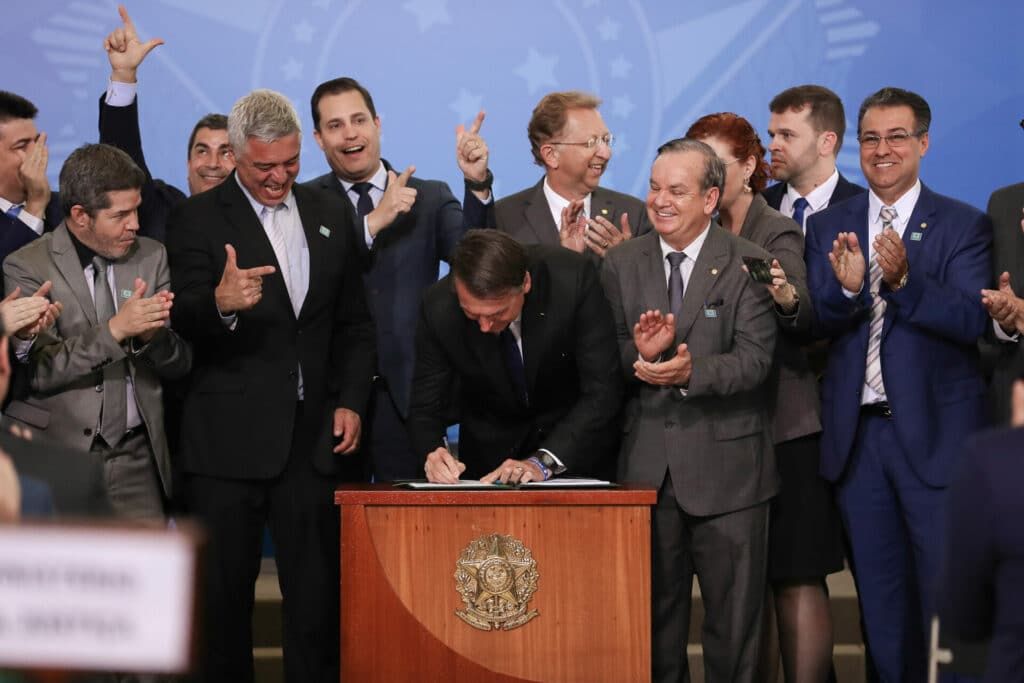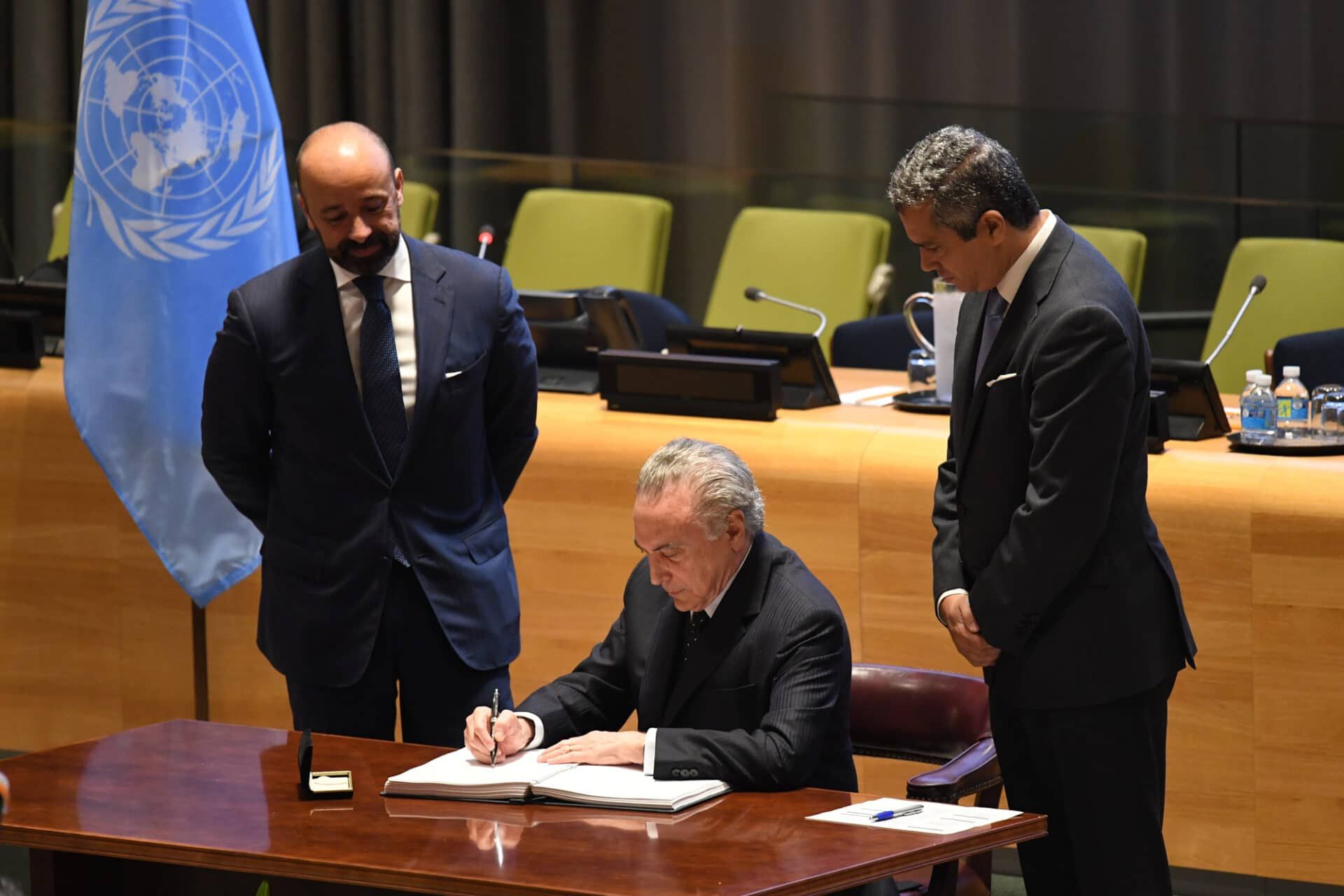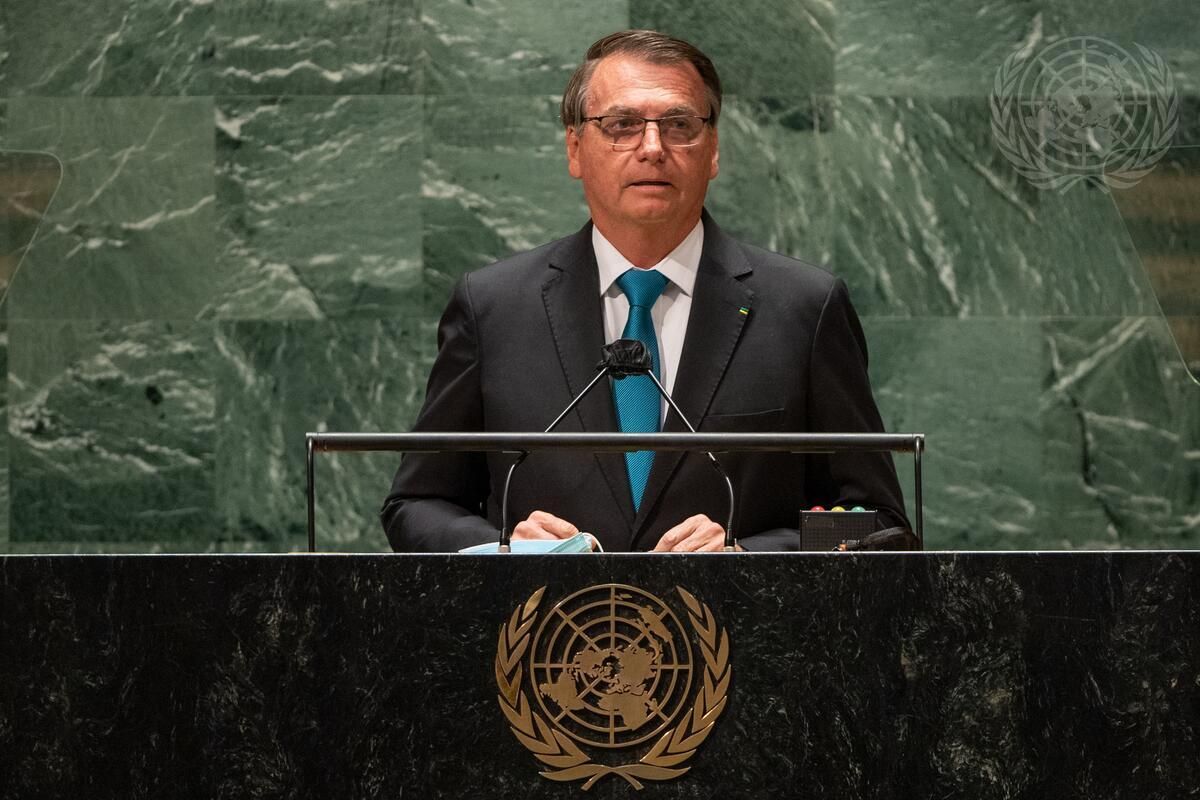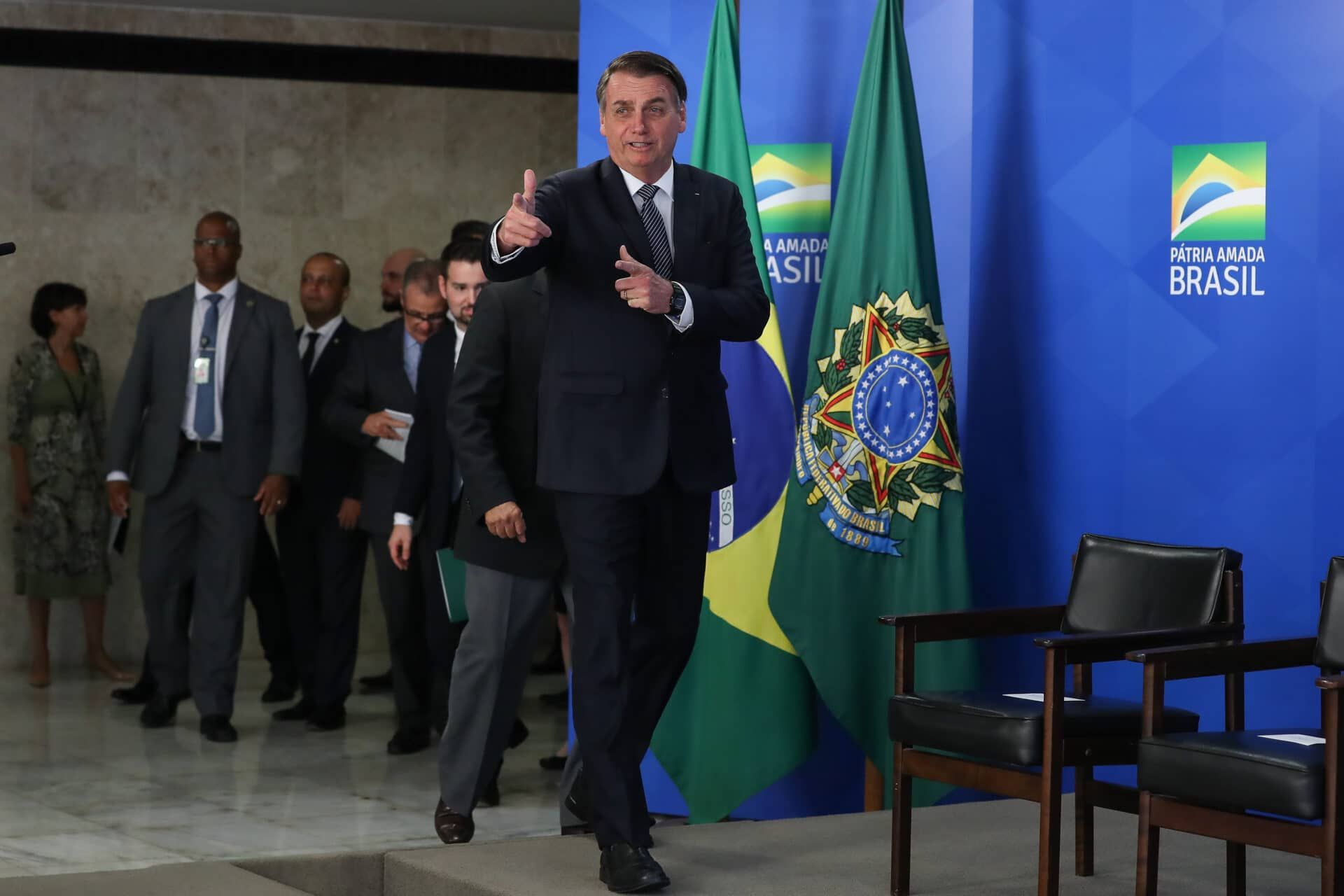Why Brazil shouldn’t let Bolsonaro stand in the way of ratifying the nuclear ban treaty
By Bárbara Cruvinel Santiago | April 19, 2022
 President Jair Bolsonaro of Brazil signs a decree relaxing gun rules in May 2019. Credit: Marcos Corrêa/PR. CC by 2.0.
President Jair Bolsonaro of Brazil signs a decree relaxing gun rules in May 2019. Credit: Marcos Corrêa/PR. CC by 2.0.
Brazil was the first country to sign the Treaty on the Prohibition of Nuclear Weapons (TPNW) in 2017, which is not surprising given Brazil’s record in disarmament advocacy. So far, dozens of countries have signed the TPNW, also known as the ban treaty, which entered into force in January 2021 after its 50th ratification by a state party. The treaty calls for the complete nuclear disarmament of these nations, as well as for their cooperation in a verification regime and on assistance to mitigate environmental impacts caused by nuclear explosions.
It is curious, however, that the treaty has yet to be ratified in Brasilia. The Brazilian government’s drastic shift to the far right after the 2018 election of President Jair Bolsonaro might be to blame. For instance, Bolsonaro’s base has ludicrously called for the construction of a “Brazilian Atomic Bomb” in a petition on the Senate’s website to bring this proposal to a vote. Such a proposal not only infringes on several international treaties that include Brazil, but also on Brazil’s own constitution, which prohibits the use of nuclear technology for non-peaceful purposes within its national boundaries.
Brazil has already given the world guarantees that it won’t build a nuclear weapon despite its developed nuclear research. However, it would be in the country’s best interest to ratify the ban treaty. Brazil could not only be a key partner to other treaty state parties, but also reap benefits of its own. However, the treaty ratification process faces stiff challenges in the National Congress of Brazil.

How Brazil became a nuclear state with no nuclear weapons. Brazil’s nuclear history goes back to the 1950s, when it had an agreement with the United States to import nuclear research technology. Brazil became a military dictatorship in 1964. In the 1970s, the United States stopped providing enriched uranium to Brazil, but the Brazilian-West German Nuclear Agreement allowed Brazil to develop its own enrichment technology and build power plants. The agreement faced strong US opposition and internal resistance from Brazilian scientists. In a document published in 1975, the Brazilian Physical Society noted that the agreement had no input from the country’s scientific community and argued that a country with so much hydropower potential should not need nuclear power plants.
During the military dictatorship, the government allegedly had a secret nuclear program called the Solimões Project. However, no evidence for nuclear weapon construction was ever found and, after the country’s return to democracy in the 1980s, the government officially closed a 300-meter-deep test site supposedly excavated for nuclear testing. More important, Brazil also started its low-enriched uranium nuclear-powered submarine program during the dictatorship.
As the country returned to democracy, the 21st article of its new constitution explicitly stated that Brazil would never build nuclear weapons or use nuclear power for non-peaceful purposes and that nuclear activities of any kind would require congressional approval. Article 21 is still the only one of its kind in the world. However, the 1988 constitution was already Brazil’s eighth, and Congress still routinely makes amendments to the constitution.
In its return to democracy, Brazil further cemented its commitments by signing and ratifying most international nonproliferation and disarmament agreements—including the Treaty of Tlatelolco in 1994, which turned Latin America into a nuclear-weapon-free zone, and the Non-Proliferation Treaty in 1996. Those treaties currently prevent Brazil from becoming a nuclear weapon state.
What is nuclear Brazil? Brazil is one of three countries considered nuclear states (with no nuclear weapons) in Latin America. While it’s home to about five percent of the world’s uranium reserves, Brazil has only two nuclear power plants, which together meet less than three percent of the country’s energy needs. Instead, clean hydropower is at the core of Brazil’s energy matrix.
In 1987, Brazil had one of the worst nuclear radiation accidents in the world. A hospital in the central Brazilian city of Goiânia improperly disposed of radiotherapy equipment, which a group of waste collectors later found. The collectors took the hardware home to disassemble it and sell its components. One of the men found a blue substance that glowed in the dark and took it home to show it to friends and family. The substance was cesium 137, a radioactive isotope. Days later, several people showed up at local hospitals with symptoms of contamination.
Investigators worked with the International Atomic Energy Agency (IAEA) and national groups on an emergency plan. The response group isolated people in several areas, demolished buildings, and disposed of 6,000 tons of radioactive waste. The emergency operation screened over 100,000 people, identifying 249 who were contaminated, four of whom died. Dozens of people were quarantined in hospital areas solely dedicated to the accident, so they could receive proper treatment and their bodily waste could be appropriately monitored and disposed of. Once the tracing and containment plan was in place, the local government established support groups to monitor and assist victims in the long term.
In 1991, Brazil joined Argentina to create the Brazilian-Argentine Agency for Accounting and Control of Nuclear Materials (ABACC). It is still the only bilateral agency of its kind in the world, and it turned a once-adversarial relationship between neighboring countries into a cooperative one. With the IAEA, of which Brazil was a founding member in 1957, ABACC implemented a verification and inspection regime that guarantees that both Brazil and Argentina are using nuclear resources safely and solely for peaceful development.
From 2003 to 2014, the Workers’ Party federal administration saw industrialization as a path out of poverty. The party revamped nuclear research, leading to the creation of Amazul, a public company to oversee nuclear development in the Navy as well as the implementation of other industries based on nuclear technology. During its tenure, the Workers’ Party finally institutionalized the nuclear-powered submarine project, which began during the dictatorship but had faced funding shortfalls since Brazil’s return to democracy.
The Brazilian military says it needs a fast submarine for two reasons: Most of Brazil’s population lives near its vast coastline, the “Blue Amazon,” and that is also where most of the country’s potential oil reserves reside. Currently, the Aramar Experimental Center in Iperó is the only military facility that officially hosts a uranium enrichment plant in a non-nuclear weapon state. While this raises questions about a verification regime, the center follows safeguards dictated by Brazil’s constitution. Outside military facilities, Brazilian scholars pursue nuclear research in places such as the Nuclear and Energy Research Institute at the University of São Paulo.

Nuclear diplomacy and the ban treaty. Brazil was one of the last major players to join the Non-Proliferation Treaty, objecting on the principle of equality. The NPT created two categories of countries, with much stricter rules for non-nuclear weapon states, something unacceptable to Brazilian diplomats. Nevertheless, the country signed and ratified the NPT in 1996 and 1998, respectively, while refusing to sign the treaty’s Additional Protocol, an expanded set of requirements for verification.
Brazil argued that it has adhered to every clause of the NPT, while nuclear weapon states that signed the treaty have not complied with their part—they have not disarmed and are not subjected to the Additional Protocol. According to Brazil, ABACC and its collaboration with the IAEA serve as a guarantee that Brazil and Argentina are under a rigorous verification regime and will never become nuclear weapon states.
Brazil supported the resolution to start drafting a ban treaty in 2016, voted in favor of the treaty in 2017, and was the first country to sign it. According to the official report Brazilian diplomats submitted to the 2020 NPT review conference, Brazil continues to be of “the undimmed persuasion that any use of weapons of mass destruction is abhorrent.” Yet the ban treaty remains controversial among Bolsonaro’s base and allies.
Domestic challenges for ratification. Bolsonaro’s election in 2018 caused a major shift to the far right in the Brazilian government. He has turned a blind eye to crimes against the environment and perpetrated several verbal attacks on women, indigenous populations, and people of color. His mismanagement of the COVID-19 pandemic, including alleged corruption involving the purchase of vaccines, is currently under investigation pending a request for an impeachment vote. Moreover, some of his supporters have gone to the streets to demand the return of a military dictatorship known for torturing political opponents. Bolsonaro has been a vocal admirer of Colonel Carlos Brilhante Ustra, recognized by a civil court as a torturer during the dictatorship.
Bolsonaro has also been a vocal gun-ownership proponent. The word “disarmament” is verboten in his base’s vocabulary, regardless of context. As long as Bolsonaro’s allies remain in control of Congress, ratification of the ban treaty will face an uphill battle. While Brazil has no nuclear weapons to disarm, and nuclear disarmament and gun laws are far from being similar, advocates will need to frame the treaty in some form that is palatable to gun advocates and conservative middle-aged voters who remember the military dictatorship with nostalgia. Doing that would be difficult, however, and perhaps the only way to get the treaty ratified would be voting Bolsonaro and his allies out of office.

How Brazil could benefit from the ban treaty. Brazil faces no immediate military or geopolitical threats, especially given its peaceful history for the last 150 years. More important, Brazil cannot build a nuclear weapon without violating its own constitution or the international mechanisms it has already ratified, so ratifying the ban treaty would not add any further restrictions. Rather, Brazil would only reap benefits from ratification.
Articles 6 and 7 of the treaty declare that state parties should assist each other with remediating the environmental and human impacts of nuclear testing. Brazil could take advantage of its expertise gained during the 1987 Goiânia accident to help other state parties and further cement its position as a leading voice among non-nuclear weapon states. These states vote on temporary members for the UN Security Council every two years, and it is no secret that Brazil has Security Council ambitions. Brazil has been a temporary member more than any other nation, but it’s hard to believe this would happen again under Bolsonaro unless he signals a change in his human-rights stances. Ratifying the ban treaty could help.
Brazil also has cutting-edge nuclear research in Navy facilities and other institutes where nuclear science thrives for peaceful uses. Brazil could establish international scientific collaborations to implement the treaty’s verification regime. It could exchange its expertise for support from other state parties in technical areas where Brazil has little experience.
The ABACC experience taught Brazil how to implement a bilateral system that makes verification of diverted materials stronger than other alternatives. Inspections in Argentina are made by Brazilian experts and vice versa, so the interested parties perform the verification directly. The inspectors are chosen by a poll of experts in each country who do not work for ABACC and whose specialties focus on the type of site that will be audited. The frequent verification between the two parties and the mutual knowledge acquired over time make it nearly impossible for either country to build a secret nuclear weapons program. Brazil could lead other ban-treaty states to adopt a similar system.
Additionally, ABACC paved the way for the creation of Mercosur, the trade bloc that integrates South America economically and politically. The ban treaty’s articles on collaboration among signatory states could lead to further integration and strengthening of nations in the Global South.
Bolsonaro’s government has tarnished Brazil’s image abroad on several fronts. However, Brazil has extensively benefited from its peaceful image in the past—allowing it to be exempt from embargoes, technological exchange restrictions, and portions of the IAEA’s verification regime despite its nuclear state status and refusal to sign the Additional Protocol. For instance, Brasilia announced in 2000 that it was moving centrifuges from the Navy to an enrichment facility in Resende, to benefit the country’s two nuclear power plants. Brazil declined the IAEA’s request for additional inspection, arguing for the need to protect intellectual property. ABACC’s long-standing relationship with the IAEA enabled alternative inspection arrangements that protected the centrifuges’ design. Situations like this exemplify why Brazil should strive to enhance its non-threatening image in the nuclear world by finally ratifying the ban treaty.
While signing the treaty would not fix Brazil’s image in its entirety—it would not address Bolsonaro’s infringement of human rights, for example—it would be a step in the right direction. Brazil played an important leading role in bringing the ban treaty into existence in 2017. It’s time for Brasilia to answer its own call and ratify the treaty.
Together, we make the world safer.
The Bulletin elevates expert voices above the noise. But as an independent nonprofit organization, our operations depend on the support of readers like you. Help us continue to deliver quality journalism that holds leaders accountable. Your support of our work at any level is important. In return, we promise our coverage will be understandable, influential, vigilant, solution-oriented, and fair-minded. Together we can make a difference.
Keywords: ABACC, Bolsonaro, Brazil, ban treaty
Topics: Nuclear Energy, Opinion, Voices of Tomorrow
















An authentic assessment of things would depict Jair Bolsonaro, Boris Johnson, Benny Gantz and Narendra Modi strangling the Statue of Liberty (maybe add Mohamed bin Salman and Scott Morrison to the stranglers).